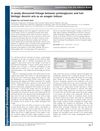 20 citations,
August 2005 in “Journal of Cutaneous Pathology”
20 citations,
August 2005 in “Journal of Cutaneous Pathology” The protein ARA70/ELE1 is involved in male pattern baldness, and lower levels of its short form may lead to hair thinning.
[object Object]  18 citations,
July 2016 in “Medicine”
18 citations,
July 2016 in “Medicine” Wnt/β-catenin and TGF-β pathways affect hair loss, and activating Wnt/β-catenin could be a potential treatment.
 17 citations,
June 2021 in “Molecules”
17 citations,
June 2021 in “Molecules” Melatonin-loaded nanocarriers improve melatonin delivery and effectiveness for various medical treatments.
 16 citations,
February 2018 in “European Journal of Endocrinology”
16 citations,
February 2018 in “European Journal of Endocrinology” Diagnosing hyperandrogenism in women is complex and requires accurate testing methods and consideration of SHBG levels.
 15 citations,
March 2014 in “Biochimica and biophysica acta. Molecular and cell biology of lipids”
15 citations,
March 2014 in “Biochimica and biophysica acta. Molecular and cell biology of lipids” ACBP is essential for healthy skin and fur by maintaining the skin's barrier function.
 11 citations,
December 2018 in “Assay and Drug Development Technologies”
11 citations,
December 2018 in “Assay and Drug Development Technologies” Natural herbal compounds might treat certain medical conditions by reducing DHT levels, but more research is needed to confirm their effectiveness and safety.
 11 citations,
March 2008 in “Experimental Dermatology”
11 citations,
March 2008 in “Experimental Dermatology” A substance called compound-1 could help increase hair growth by maintaining prostaglandin levels in hair follicles.
[object Object]  10 citations,
August 2014 in “Experimental Dermatology”
10 citations,
August 2014 in “Experimental Dermatology” Decorin, a protein, may help start hair growth and could be used to treat hair loss.
 9 citations,
November 2020 in “Medical Hypotheses”
9 citations,
November 2020 in “Medical Hypotheses” Hair loss may link to weaker COVID-19 immunity, suggesting possible need for extra vaccine boost.
 7 citations,
July 2018 in “Journal of Functional Biomaterials”
7 citations,
July 2018 in “Journal of Functional Biomaterials” A new anti-baldness patch effectively treats hair loss by blocking enzymes linked to the condition.
 7 citations,
January 2003 in “Elsevier eBooks”
7 citations,
January 2003 in “Elsevier eBooks” Testosterone is crucial for development, growth, and various body functions in mammals.
 6 citations,
September 2012 in “Clinical Interventions in Aging”
6 citations,
September 2012 in “Clinical Interventions in Aging” Honokiol might help reduce male skin aging by maintaining testosterone levels.
 5 citations,
July 2003 in “Drug Development Research”
5 citations,
July 2003 in “Drug Development Research” Fluridil promotes hair growth safely and effectively for androgenetic alopecia.
 4 citations,
July 2015 in “Veterinary Dermatology”
4 citations,
July 2015 in “Veterinary Dermatology” Two types of 5α-reductase are in dog skin, which might make dutasteride better than finasteride for treating dog hair loss.
 4 citations,
October 2007 in “Dermatologic Clinics”
4 citations,
October 2007 in “Dermatologic Clinics” Glucocorticoids and sex hormones affect skin health, with potential for targeted treatments to minimize side effects and treat skin conditions.
 3 citations,
May 2016 in “International Journal of Research in Ayurveda and Pharmacy”
3 citations,
May 2016 in “International Journal of Research in Ayurveda and Pharmacy” Ayurveda, using herbs like ginger, garlic, and turmeric, can reduce chemo-radiotherapy side effects in cancer patients.
 2 citations,
January 2015 in “Springer eBooks”
2 citations,
January 2015 in “Springer eBooks” Environmental factors and exposure to toxins may contribute to male infertility by affecting sperm and hormone function.
 1 citations,
December 2023 in “Curēus”
1 citations,
December 2023 in “Curēus” Tadalafil is effective for treating urinary symptoms in men with BPH.
 1 citations,
March 2021 in “Skin health and disease”
1 citations,
March 2021 in “Skin health and disease” Better hair loss models needed for research.
 1 citations,
January 2015 in “Hair therapy & transplantation”
1 citations,
January 2015 in “Hair therapy & transplantation” Some supplements and hormones can increase hair loss by raising DHT levels.
 January 2018 in “Elsevier eBooks”
January 2018 in “Elsevier eBooks” The document explains how male reproductive hormones work and affect the body.

Chrysanthemum zawadskii extract may help treat hair loss by promoting hair growth and affecting growth factors.
 June 2020 in “Aesthetic Surgery Journal”
June 2020 in “Aesthetic Surgery Journal” Estradiol-rich plasma can increase hair density faster and more effectively in male pattern baldness treatment than regular plasma.
 308 citations,
December 2018 in “PLOS Genetics”
308 citations,
December 2018 in “PLOS Genetics” The research found that PCOS has common genetic factors regardless of how it is diagnosed and is linked to metabolic and reproductive issues.
 138 citations,
July 2015 in “Clinical, Cosmetic and Investigational Dermatology”
138 citations,
July 2015 in “Clinical, Cosmetic and Investigational Dermatology” Eating less sugar, milk, and saturated fats and more vegetables and fish may help treat and prevent acne.
 134 citations,
April 2020 in “Journal of Cosmetic Dermatology”
134 citations,
April 2020 in “Journal of Cosmetic Dermatology” Male pattern hair loss could hint at androgens affecting COVID-19 severity.
 112 citations,
May 2019 in “Pharmacological Research”
112 citations,
May 2019 in “Pharmacological Research” Lignans and neolignans from plants may help protect against various health issues, including cancer and heart disease.
 98 citations,
December 2008 in “Journal of Investigative Dermatology”
98 citations,
December 2008 in “Journal of Investigative Dermatology” Prolactin affects hair growth and skin conditions, and could be a target for new skin disease treatments.
 75 citations,
June 2019 in “International Journal of Molecular Sciences”
75 citations,
June 2019 in “International Journal of Molecular Sciences” Costunolide may have multiple health benefits, including promoting hair growth and protecting against cancer and diabetes, but more research is needed.
 75 citations,
November 2016 in “Medicines”
75 citations,
November 2016 in “Medicines” Beta-sitosterol has potential health benefits but needs more research to fully understand its effects and improve its use in treatments.






























